| ‹ 2024 | ||||
| United States Presidential Election, 2028 | ||||
|---|---|---|---|---|
| November 4, 2028 | ||||
| Turnout | 62.4% | |||
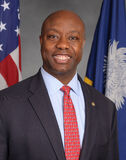
|
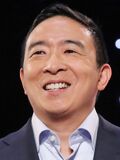
|
|||
| Nominee | Tim Scott | Andrew Yang | ||
| Party | Republican | Democratic | ||
| Home state | South Carolina | New York | ||
| Running mate | Pat Toomey | Beto O'Rourke | ||
| Electoral vote | 359 | 179 | ||
| States carried | 39 | 11+DC | ||
| Popular vote | 74,232,411 | 63,875,021 | ||
| Percentage | 54.77% | 43.62% | ||
The 2028 United States presidential election took place on Tuesday, November 4th, 2028. The incumbent Republican president Tim Scott and his vice president Pat Toomey defeated Democratic challenger Andrew Yang and his running mate Beto O'Rourke. The election was the second straight election where both nominees were people of color, and the first time since Barack Obama in 2012 where the incumbent party won reelection.
Tim Scott was an immensely popular president throughout his first term, and as a result the Democratic Party had a smaller primary field, with many prominent candidates seeing Scott's reelection as a formality. Andrew Yang and Pete Buttigieg were consistently the leaders in the polls, with Yang winning the nomination.
The election was the most lopsided victory since Barack Obama's victory in 2008, and the most lopsided for a Republican since 1988. Scott managed to win 11 states which he lost in 2024, while retaining every state that he won. He also received the most presidential votes in United States history, surpassing Joe Biden's total in the 2020 election. He became the first president since Barack Obama to serve multiple terms.
Background[]
Following Tim Scott's victory in the 2024 election, the Republicans had control of the White House, Senate, and House. Just four months following Scott's inauguration, Supreme Court Justice Clarence Thomas retired. Scott nominated Patrick Wyrick, just 44 years old, to replace him. With the Republicans holding a 52-48 majority in the Senate, Wyrick was easily confirmed.
The second notable moment of Scott's first term was the nationwide riots that occurred in 2026 following the killing of an unarmed black man in Philadelphia. Protests and riots unfolded all around the country, with calls to defund the police, which was now slowly gaining nationwide support. Scott was widely praised by both parties for his response, meeting with protestors outside the White House and giving his support to the Black Lives Matter movement. On May 4, 2026, following weeks of protests and riots, Scott signed a bipartisanship bill to demilitarize the police and cut police funding in favor of education. Scott's approval rating jumped to 70% following the protests, with many thrilled with the way he handled the protests compared to Donald Trump's response to the George Floyd protests in 2020.
With Scott's high popularity, the Republicans retained their majority in the Senate and House in the 2026 midterms. The Republicans used the majority to approve massive tax cuts and strengthen immigration laws. Scott also unveiled plans to repeal and replace Obamacare, but the motion did not pass through the Senate, with three Republicans objecting.
Republican Primary[]
With Scott's approval rating consistently above 50% throughout his first term, no prominent Republican official considered a primary run against Scott. However, with the far right wing of the party furious over Scott's decision to cut police funding in 2026, he received a primary challenge from NYPD Police Chief Benny Romano. Alex Jones, the host of the controversial, far right show InfoWars, also staged a primary against Scott.
Republican Candidates[]
- Tim Scott, 47th President of the United States
- Benny Romano, NYPD Police Chief (refused to endorse)
- Alex Jones, host of InfoWars (endorsed Scott)
Campaign[]
Neither Romano nor Jones' campaigns were taken seriously, and Scott did not acknowledge either. Romano peaked at about 6% in November of 2027, while Alex Jones never surpassed 2% of the vote. Both Jones and Romano remained in the race until the Republican Convention, with Romano receiving 4.7% of the nationwide vote (receiving two delegates) and Jones receiving 1.8%.
Republican National Convention[]
The 2028 Republican National Convention was held from August 14-17, 2028 in Philadelphia, Pennsylvania. Prominent speakers included Vice President Pat Toomey, Tom Cotton, Donald Trump Jr., Peyton Manning, and former presidents Donald Trump and George W. Bush.
Former Republican Presidential Endorsements[]
- George W. Bush, 43rd President of the United States from 2001-2009 (endorsed Scott)
- Donald J. Trump, 45th President of the United States from 2017-2021 (endorsed Scott)
Democratic Primary[]
With Scott's approval ratings consistently above 50%, and the GOP seeing great success in the 2026 midterms, Scott's reelection felt inevitable. As a result, many notable Democratic candidates such as Alexandria Ocasio-Cortez, Andrew Cuomo, and Gavin Newsom declined to run.
Democratic Candidates[]
- Andrew Yang, New York businessman
- Pete Buttigieg, former mayor and commerce secretary under Joe Biden (endorsed Yang)
- Charles Booker, Kentucky representative (endorsed Yang)
- Cory Booker, New Jersey senator (endorsed Buttigieg, then Yang)
- Tammy Baldwin, Wisconsin senator (endorsed Yang)
- J.B. Pritzker, former Governor of Illinois (endorsed Buttigieg, then Yang)
- Brendan Boyle, Governor of Pennsylvania (endorsed Buttigieg, then Yang)
- Tim Kaine, Virginia senator and 2016 vice presidential candidate (endorsed Buttigieg, then Yang)
- Brian Schatz, Hawaii senator (endorsed Buttigieg, then Yang)
- Jerry Chester, Florida representative (endorsed Charles Booker, then Yang)
Declined to be Candidates[]
- Alexandria Ocasio-Cortez, New York senator (endorsed Charles Booker, then Yang)
- Andrew Cuomo, Governor of New York since 2011 (endorsed Buttigieg, then Yang)
- Gavin Newsom, former Governor of California (endorsed Cory Booker, then Yang)
- Bernie Sanders, Vermont senator (endorsed Charles Booker, then Yang)
- Kamala Harris, former Vice President and 2024 presidential candidate (endorsed Cory Booker, then Buttigieg, then Yang)
- Hillary Clinton, 2016 presidential candidate (endorsed Yang)
Early Months[]
With a smaller field due to Scott's expected reelection, Andrew Yang and Pete Buttigieg were the strong frontrunners as the campaign got underway in early 2023. Buttigieg was playing off the base of former president Joe Biden, attempting to run as a centrist candidate. Yang ran on the concept of change, arguing for overhauls in the system and targeting the youth vote.
In the first primary debate in June, Yang had an extremely impressive performance. He branded himself as a relatable, non-politician who would bring a fresh view to the White House. Charles Booker, a relatively unknown Kentucky representative, also impressed, echoing many of the ideas that Bernie Sanders presented in 2016 and 2020. Following the debate, Yang took a wide lead in the polls at 36%, with Buttigieg at 27%, Cory Booker at 11% and Charles Booker at 6%.
The first candidate to drop out was progressive Jerry Chester from Florida in August, who was polling below 1%. Chester endorsed Charles Booker. Brian Schatz, a Hawaii senator, would follow in September, and he endorsed Buttigieg.
Early Primaries[]
Heading into the early primaries, Yang and Buttigieg continued to run well ahead of the rest of the field, with
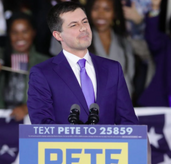
Buttigieg speaks following his victory in Iowa
Cory Booker a distant third. Despite scoring endorsements from Brendan Boyle, J.B. Pritzker and Tim Kaine following their exits from the field, Buttigieg remained behind Yang in the polls, largely due to his massive struggles with the black vote.
In the Iowa primary, Buttigieg surprisingly defeated Yang, getting 42% of the vote to Yang's 33%. Charles Booker, the progressive from Kentucky, received a surprising 15% of the vote, barely making the threshold for delegates. Following the primary, Tammy Baldwin, who received just 2%, dropped out and endorsed Yang.
Buttigieg would capitalize on his momentum with another victory in New Hampshire a week later. Even though Yang continued to hold a steady lead nationally, Buttigieg won the first two primaries and opened up a delegate lead.
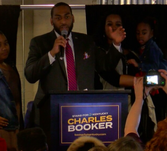
Charles Booker speaks after a stunning victory in the South Carolina primary
However, Yang would get a massive win in Nevada, getting over 60% of the vote. Charles Booker continued to surprise and received over 10% of the vote in each of the first three primaries. Cory Booker would drop out and endorse Buttigieg following a disappointing finish in Nevada.
With neither Yang nor Buttigieg strong on the black vote, Charles Booker would get a stunning victory in
South Carolina, days before Super Tuesday. Booker received 34% of the vote, while Yang got 30% and Buttigieg at 17%. While Booker was still an extreme longshot for the nomination, he had made his stamp on the political landscape for years to come.
Super Tuesday[]
Heading into Super Tuesday, Yang and Buttigieg were virtually tied in the delegate count, with Booker not far behind. It was thought that Super Tuesday would play a massive role in deciding the race, especially with
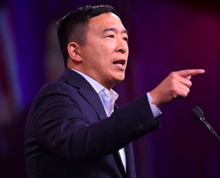
Yang speaks after a successful Super Tuesday
multiple states moving their primaries up to Super Tuesday prior to the 2028 primaries.
Yang would have a successful day, winning Arkansas, California, Colorado, Florida, Maine, North Carolina, Oklahoma, Tennessee, Utah, and Vermont. Buttigieg would win Massachusetts, Minnesota, Pennsylvania, Texas, and Virginia, while Booker won Alabama.
Yang would leave Super Tuesday with a delegate lead, but Buttigieg was well within striking distance. Booker, despite an incredibly successful campaign, did not have a path to the nomination and dropped out of the race to endorse Yang.
Later Primaries[]
Sensing the nomination, Yang went on the offensive against Buttigieg, arguing that the White House needed fresh blood and that the only person that could defeat Tim Scott, an immensely popular president, was an outsider. With Booker suspending his campaign, progressives and the youth vote were united behind Yang, and he took a commanding lead in the polls over Buttigieg.
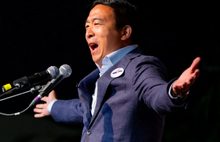
Yang celebrating with supporters after winning the New York primary, essentially securing the nomination
A week after Super Tuesday, Yang would get large victories in Arizona, Mississippi and Oregon, while narrowly losing in Michigan and Idaho. Yang expanded his delegate lead but Buttigieg was still in the race.
Two weeks later, Yang would win Wisconsin and Georgia, and began to pull away from Buttigieg.
In late April, with Yang closing on the 1,991 delegates needed to clinch the nomination, he got 70% of the vote in New York. Following his defeat in New York, Buttigieg would drop out and endorse Yang, making Yang the presumptive nominee for president.
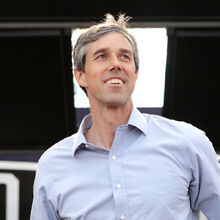
Andrew Yang's VP, Beto O'Rourke
Vice Presidential Choice[]
After he secured the nomination, Yang began vetting potential vice presidential candidates. He reportedly offered the slot to Alexandria Ocasio-Cortez, but she declined and decided to stay in the Senate. In June, CNN leaked Yang's shortlist for VP: Cory Booker, Georgia governor Stacey Abrams, Tammy Baldwin, and Beto O'Rourke.
On July 4, Yang announced Beto O'Rourke as his running mate during a rally in Dallas, Texas to celebrate the 4th of July. Yang cited O'Rourke's record as a cabinet member in the Biden administration, and his strong stance against gun control as his reasons for going with O'Rourke. O'Rourke was also hopeful to help Yang win Texas.
Democratic National Convention[]
The Democratic Convention was held July 31-August 3rd in Atlanta, Georgia. Notable speakers included Beto O'Rourke, Bernie Sanders, Alexandria Ocasio-Cortez, Andrew Cuomo, Charles Booker, and former president Barack Obama.
Former Democratic Presidential Endorsements[]
- Bill Clinton, 42nd President of the United States from 1993-2001 (endorsed Yang)
- Barack Obama, 44th President of the United States from 2009-2017 (endorsed Yang)
- Joe Biden, 46th President of the United States from 2021-2025 (endorsed Yang)
General Election[]
Despite Yang's nationwide popularity, Scott remained the strong favorite to win reelection as the general election kicked off. Yang held a wide lead over Scott in the 18-34 age category, but Scott led everywhere else. Independents, which favored Yang over Buttigieg by a wide margin in the primaries, were strongly favoring Scott.
Summer Months[]
While Scott did not attack Yang directly, his vice president Pat Toomey vehemently attacked Yang and his running mate Beto O'Rourke, saying that they wanted to return the country to the Obama/Biden years. Despite Scott's immense popularity, his lead began to shrink as the calendar turned towards September. He was still the favorite, but Yang's campaign was gaining confidence.
Debates[]
The first presidential debate was held on September 27 at Villanova University. Yang was thought to have performed very strongly, again arguing for new blood in Washington and pointing out that while Scott had done some good things as president, notably the police defunding bill, many problems still existed. Following the debate, Yang pulled within 3 points of Scott nationally, and the election was looking competitive.
Scott performed well in the final two debates, however, turning the tables on Yang on his lack of experience and pointing out the many successes of his first term in office. He argued that he had one of the highest approval ratings ever for a first term president, and that the American people needed his leadership. Following the debates, Scott's lead grew, with his reelection looking more and more likely.
Election Night[]
Despite Yang's brief momentum, Scott entered Election Day as the heavy favorite. Early in the election, many trends favored Scott, with exit polls in swing states such as Pennsylvania and Michigan showing a large
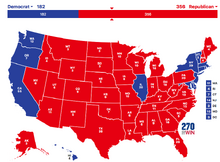
Scott lead.
Early in election night coverage, Scott was projected as the winner in swing states such as Pennsylvania and Michigan. He also would win southern swing states, and score an upset victory in Minnesota. After Texas was called for Scott at 11:12 PM EST, the incumbent president surpassed the 270 electoral votes needed for reelection. Yang called Scott and conceded the election shortly thereafter, and Scott spoke to jubilant supporters in Charleston, South Carolina shortly before midnight.
Aftermath[]
Despite Scott's high approval rating making a reelection likely, 2028 was a disappointing election for Democrats. They lost massive swing states such as Pennsylvania, Florida, Michigan, and Wisconsin for the 3rd time in the previous 4 elections, and expected Democratic states such as Arizona, Virginia, and Minnesota surprisingly flipped red. Furthermore, Democrats had long planned on Texas flipping blue by the 2028 election, but Scott won Texas by two more points than he did in 2024. To make matters worse, Scott won nearly 30% of the African-American vote, the highest for a Republican candidate since 1956.
As for Scott and the Republicans, they retained a majority in the Senate and House, and Scott held an approval rating over 60% heading into his second term. Scott was inaugurated for his second term on January 20, 2029, and promised to continue fighting for the American people.
